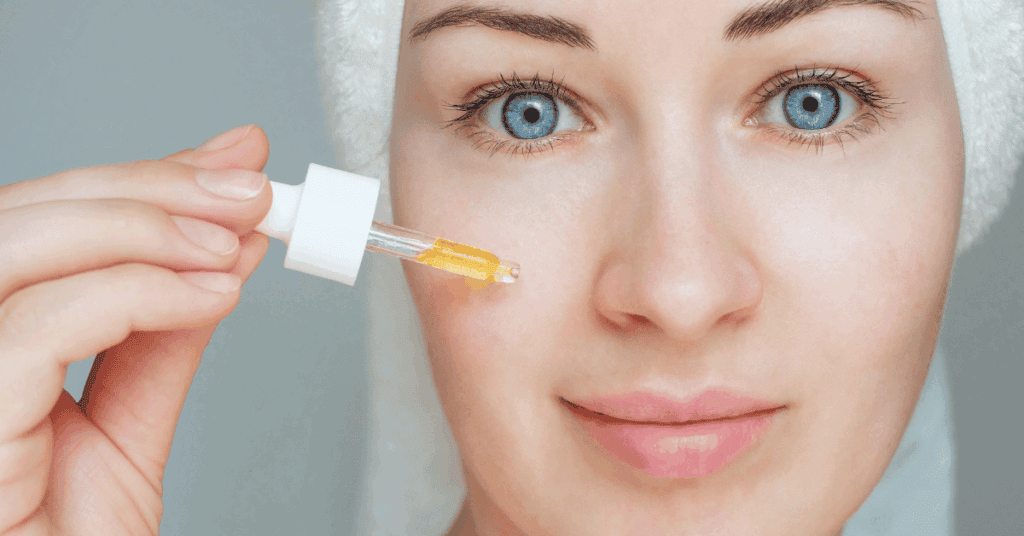
Does Vitamin C Help with Sun Damage or Dark Spots?
Age spots and sun damage are common skin problems that affect most people as they get older. If you're dealing with dark marks from sun exposure or acne, you might wonder if there's help available. The good news is that a vitamin c serum might be exactly what your skincare routine needs.
Vitamin C has become one of the most talked-about ingredients in skincare products, and for good reason. But does it really work for sun damage and dark spots? Let's look at the science and find out what this powerful ingredient can do for protecting your skin.
What Are Dark Spots and Sun Damage?
Dark spots happen when certain areas of your skin cells make too much melanin - the natural pigment that gives your skin its colour. There are several types:
Sun spots (age spots): These appear after years of UV rays exposure. Your skin makes extra melanin to protect itself, but sometimes this melanin clumps together.
Acne marks: When spots heal, they can leave behind dark marks due to inflammation.
Melasma: This creates larger patches of darker skin, often triggered by hormones or sun exposure.
All these dark spots form the same way - your skin produces too much melanin in one area.
How Does Vitamin C Work on Dark Spots?
Vitamin C is an antioxidant that protects your skin cells from damage. Here's how it tackles dark spots:
Stops melanin production: Vitamin C blocks tyrosinase, an enzyme your skin needs to make melanin. Less tyrosinase means fewer dark spots.
Fights oxidative stress: Oxidative stress from pollution and UV rays damages skin cells. When skin is damaged, it makes more melanin. Vitamin C prevents this damage.
Improves skin texture: Vitamin C supports your skin's natural repair process, helping fine lines and overall skin texture.
Protects skin from the sun: When used with sunscreen, vitamin C provides extra protection against UV rays.
The Science Behind Vitamin C
Research shows that vitamin c serum really works for sun damage and dark spots. According to Harvard Health, clinical studies show that daily use of vitamin C for at least three months improved fine lines, wrinkles, and overall skin texture.
Studies found that 73% of people saw improvement in their dark spots whilst using topical vitamin C. The ingredient also helps protect blood vessels under the skin and reduces signs of sun damaged skin.
Types of Vitamin C in Skincare
Different forms of vitamin C work for different skin types:
L-ascorbic acid: The pure form that's most researched. Very effective but can irritate sensitive skin.
Magnesium ascorbyl phosphate: Gentler option that's good for sensitive skin types.
Sodium ascorbyl phosphate: Another gentle form that works well for acne-prone skin.
For best results with dark spots, try ascorbic acid if your skin can handle it, or choose gentler forms for sensitive skin.
How to Use Vitamin C for Dark Spots
| Time of Day | Benefits | How to Use |
|---|---|---|
| Morning | Protects against daily damage | Apply after cleansing, before moisturiser |
| Evening | Helps skin repair overnight | Apply after cleansing, before other treatments |
Step-by-step application:
- Cleanse your skin
- Apply vitamin c serum to clean, dry skin
- Wait 5-10 minutes to absorb
- Apply moisturiser
- Always apply sunscreen in the morning
Important tips:
- Start with 10-15% concentration
- Always apply sunscreen during the day
- Store vitamin C in a cool, dark place
- Use broad spectrum sunscreen for best protection
What to Look for in Vitamin C Products
When choosing skincare products with vitamin C:
Concentration: Look for 10-20% vitamin C. Lower amounts might not work, whilst higher ones can cause side effects.
Packaging: Vitamin C breaks down in light and air. Choose products in dark containers.
Additional ingredients: Some ingredients boost vitamin C's effects, like vitamin E.
Combining Vitamin C with Other Ingredients
Good combinations:
- Vitamin E: Boosts antioxidant effects
- Hyaluronic acid: Adds hydration
- Broad spectrum sunscreen: Essential for protecting your skin
Use carefully:
- Retinol: Can cause side effects when used together. Try vitamin C in morning, retinol at night
Real Results: What to Expect
What vitamin C can do:
- Fade existing age spots over time
- Prevent new damage when used with sunscreen
- Improve skin texture and brightness
- Reduce oxidative stress from pollution
What it cannot do:
- Work overnight - results take 6-12 weeks
- Replace sunscreen for sun protection
- Remove very deep spots completely
Most people see improvements after 4-6 weeks of adding vitamin c serum to their skincare routine.
The Role of Sunscreen
Sunscreen is essential when treating dark spots. UV rays can darken existing spots and create new ones. Even the best vitamin c serum won't help if you're not protecting your skin from further damage.
Always use broad spectrum sunscreen SPF 30 or higher. Think of vitamin C and sunscreen as a team - they work together to protect skin from the sun and prevent sun damaged skin.
Side Effects and Safety
Topical vitamin C is safe for most skin types, but some people may experience side effects:
- Mild irritation when starting
- Redness or stinging (usually temporary)
- Increased sensitivity
To avoid side effects:
- Start with lower concentration
- Use once daily initially
- Test on a small area first
People with sensitive skin should try gentler forms of vitamin C first.
Frequently Asked Questions
How long does vitamin C take to work on dark spots? Most people see improvements after 4-6 weeks of daily use. Significant results appear after 3 months. You need to use vitamin c serum regularly to maintain results.
Can I use vitamin C if I have sensitive skin? Yes, but choose gentler forms for your skin type. Start with lower concentration and use less frequently until your skin adjusts.
Should I use vitamin C morning or evening? Both work, but morning is ideal because vitamin C protects against daily damage. Always apply sunscreen after morning use.
What are the main side effects? Side effects are usually mild and include temporary redness or stinging. These often improve as your skin gets used to the product.
The Bottom Line
Vitamin C is proven effective for treating age spots and sun damaged skin. The science shows it works, but needs patience and consistency in your skincare routine.
Key points to remember:
- Vitamin c serum blocks melanin production and fades existing spots
- It protects skin cells from oxidative stress and UV rays
- Results take 6-12 weeks with consistent use
- Always apply sunscreen for best results
- Choose skincare products suited to your skin type
At Voilà Pure, our Advanced Vitamin C Serum contains effective ascorbic acid designed for all skin types. Combined with our Advanced Eye Gel for delicate areas, you can target age spots and improve skin texture across your entire face.
Remember, treating sun damaged skin takes time. With consistent use of vitamin c serum, proper sun protection, and patience, you can achieve the clearer skin you want whilst protecting your skin from future damage.




